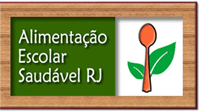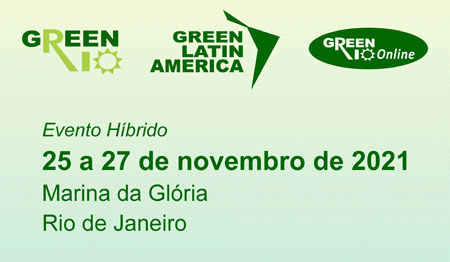
With over a thousand people enrolled, the fourth edition of “Green Rio / Rio Orgânico” exceeds expectations and reinforces the position of this event as a business platform for organic and sustainable products. The event, organized by Planeta Orgânico, took place on May 20 and 21 at the Rio de Janeiro Botanical Gardens, and was sponsored by SEBRAE, the Confederação Nacional do Comércio (National Trade Confederation) , Itaipu Binacional and Banco do Brasil.
During the opening ceremony, the Rio de Janeiro Healthy School Meal Award was launched. The Mayors of Três Rios, Paraíba do Sul and Itaperuna and the Environment Secretary for Pinheiral signed the commitment to the project, which has the support of SEBRAE. Planeta Orgânico invited Danish researcher Bent Mikkelsen, of Aalborg University, to talk about the school food topic. Representatives of Education Secretariats, of SENAI/FIRJAN and of SEBRAE also took part in the panel on the subject of school meals.
_____________________________________________________________________________________________________________
|
MAYORS OF ITAPERUNA, PARAÍBA DO SUL AND TRÊS RIOS AND THE SECRETARY FOR THE ENVIRONMENT AND RURAL DEVELOPMENT OF PINHEIRAL SIGN A COMMITMENT TO THE STATE OF RIO DE JANEIRO’S HEALTHY SCHOOL MEAL PROJECT AT GREEN RIO |

The Healthy School Meal RJ Award was launched on May 20, 2015, during the Green Rio event at the Rio de Janeiro Botanical Gardens. On that occasion, the Mayors of Três Rios, Paraíba do Sul and Itaperuna signed the commitment to the project. Marlon Sarubi, Environment and Rural Development Secretary of Pinheiral, also signed the Declaration of Commitment, representing the Mayor of Pinheiral.
Luiz Carlos Barbosa gave a presentation on the Healthy School Meal RJ Project, placing the theme of healthy school food in the context of the global scenario, and showing the indicators that will be considered for the Healthy School Meal RJ Award. Increased consumption of fruit and vegetables, a reduction in the use of industrialized products, and especially the purchase of local food products will be the benchmarks used in evaluating the school meals involved in this initiative.

Luiz Carlos Barboza
In the panel coordinated by Luiz Carlos Barbosa, Carla Monnerat and Francine Fontainha, the Education Secretaries of Três Rios and Paraíba do Sul, respectively, presented the initiatives that are already taking place in these municipalities with regard to school meals, in full conformity with the Healthy School Meal RJ Project.
Another member of this panel was Antonio Tavares, Manager of SENAI’s Food and Drink Center. He was representing FIRJAN (the Rio de Janeiro Industry Federation), which will be a partner in the State of Rio de Janeiro’s Healthy School Meal Project, in which it will play an important role.
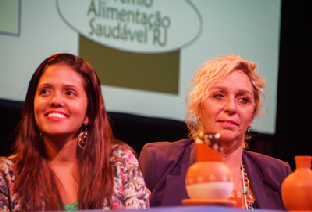 Francine Fontainha e Carla Monnerat |
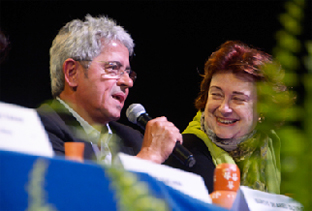 Antonio Tavares |
Planeta Orgânico, the event’s organizer, invited the Danish researcher Bent Mikkelsen, of Aalborg University, to talk about the school food theme. Bent presented his research on local purchasing as a challenge to the global food chains.
In the evaluation of the State Agriculture Secretary, Christino Áureo, who attended the Green Rio event, the initiative is another way of stimulating municipal administrations to value their local agricultural production.
The Mayor of Três Rios, Vinicius Farah, pointed out that good-quality school meals ensure that students are better prepared for learning.
The Mayor of Itaperuna, Alfredão, stressed the presence of farmers at the event, which was attended by over 40 rural producers from the municipality. The Mayor of Paraíba do Sul, Marcinho Abreu, mentioned the quality of the Green Rio event, showing his interest in having a similar event focusing on the State’s Central-Southern region in the second semester. The town of Trajano de Moraes is also taking part in the project and undertook to sign the commitment to healthy school meals.
Itaipu’s General Coordinator, Nelton Friedrich, due to the fact that he was abroad during the Green Rio event, sent a message to the organizers, stating his support for the Rio de Janeiro Healthy School Meal Project. To check Nelton Friedrich’s message, please click on the link below.
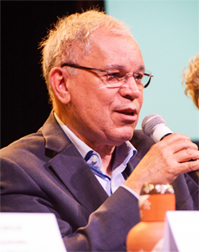 Evandro Peçanha |
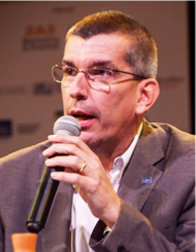 Ênio Queijada |
Further information at:
http://www.rioescolasaudavel.com.br/index-eng.html
______________________________________________________________________________________________________________
Novelties among Exhibitors
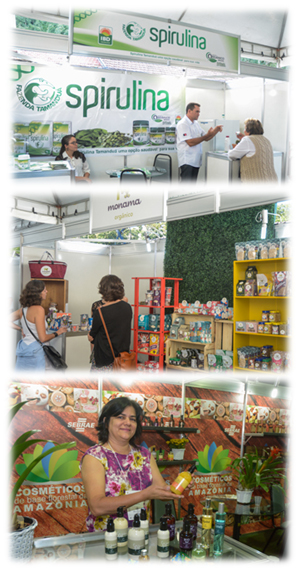 Companies bring their novelties, presenting cosmetics from the Amazon region, sustainable pirarucu (a freshwater fish), fruit and honey from the South and the Northeast, cereals, Portuguese olive oil, agave sweetener, family farm products, handicrafts and other products of the State of Rio de Janeiro.
Companies bring their novelties, presenting cosmetics from the Amazon region, sustainable pirarucu (a freshwater fish), fruit and honey from the South and the Northeast, cereals, Portuguese olive oil, agave sweetener, family farm products, handicrafts and other products of the State of Rio de Janeiro.
Fazenda Tamanduá, from the State of Paraíba, brought organic spirulina, which reduces cholesterol, enhances the immune system and benefits the intestinal flora. The entrepreneur Pierre Landolt, the person who was inspired to produce it, hopes to include the product, for example, in school meals. Another novelty at the event was the freshwater fish pirarucu and pintado from the company Mar&Terra, which raises fish by the aquiculture method in the State of Mato Grosso do Sul.
Monama, from São Paulo, presented its range of organic products, such as cereals, peanut butter, flours and other lactose and gluten-free products. Family farm products were also present, thanks to the Agrarian Development Ministry’s office in Rio de Janeiro.
The Amazon Forest-Based Cosmetics Project presented products from seven states: Acre, Amapá, Amazonas, Pará, Roraima, Rondônia and Tocantins. They range from shampoos, toilet soaps, vegetable sponges and essences to perfumes and ingredients for the cosmetics industry. The project is supported by SEBRAE and has been increasing its presence in the Rio de Janeiro market. Itaipu Binacional took part once again, presenting its socio-environmental program Cultivando Água Boa (Cultivating Good Water), as well as organic products and handicrafts made by the Indians in its region.
Presentations during the Conference
In order to address the topic of school meals, Bent Mikkelsen presented his research on local purchases as 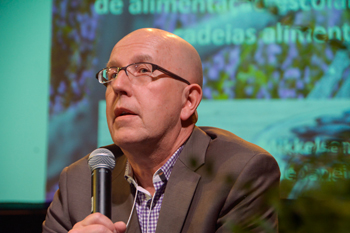 a challenge to the global food chains, and also addressed the issue of children and young people’s relationship with nature in a world that is increasingly globalized and technological.
a challenge to the global food chains, and also addressed the issue of children and young people’s relationship with nature in a world that is increasingly globalized and technological.
In addition to the school meal theme, which was given special emphasis in the event, other issues received attention at Green Rio 2015. In the Research, Innovation and Market panel, Reginaldo Morikawa, Director-Superintendent of Korin Agropecuária, presented data showing that the organic product market alone has advanced at average rates over 20% a year in Brazil, reaching about R$ 2.5 billion in 2014 and with prospects of reaching R$ 10 billion in 2020. In global terms, it has a turnover above US$ 70 billion. In the same panel, entrepreneur Maria Fernanda Rizzo talked about her experience in founding Empório Papinha, a chain of stores that sell organic baby food, which sold R$ 1.1 million in 2014.
Check next week, by visiting the Planeta Orgânico website, further information on other Green Rio panels and the presentations given during the event.
Business Rounds
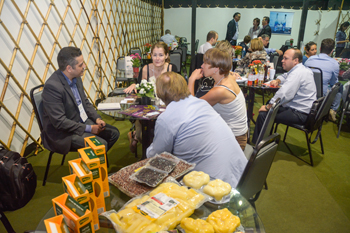 Green Rio held international business rounds with buyers from Peru, Colombia, Denmark and Estonia. The meetings were organized by the Brazilian Association of Food and Beverage Exporters and Importers (Abba), within APEX Brasil’s “Brazilian Flavors” project. Abba’s executive president, Raquel de Almeida Salgado, pointed out that conquering the international market is possible, but requires great commitment on the part of companies. In addition to the international rounds, there were meetings organized by Planeta Orgânico, with buyers from restaurant and supermarket chains, focusing on the domestic market.
Green Rio held international business rounds with buyers from Peru, Colombia, Denmark and Estonia. The meetings were organized by the Brazilian Association of Food and Beverage Exporters and Importers (Abba), within APEX Brasil’s “Brazilian Flavors” project. Abba’s executive president, Raquel de Almeida Salgado, pointed out that conquering the international market is possible, but requires great commitment on the part of companies. In addition to the international rounds, there were meetings organized by Planeta Orgânico, with buyers from restaurant and supermarket chains, focusing on the domestic market.
_____________________________________________________________________________________________________________

